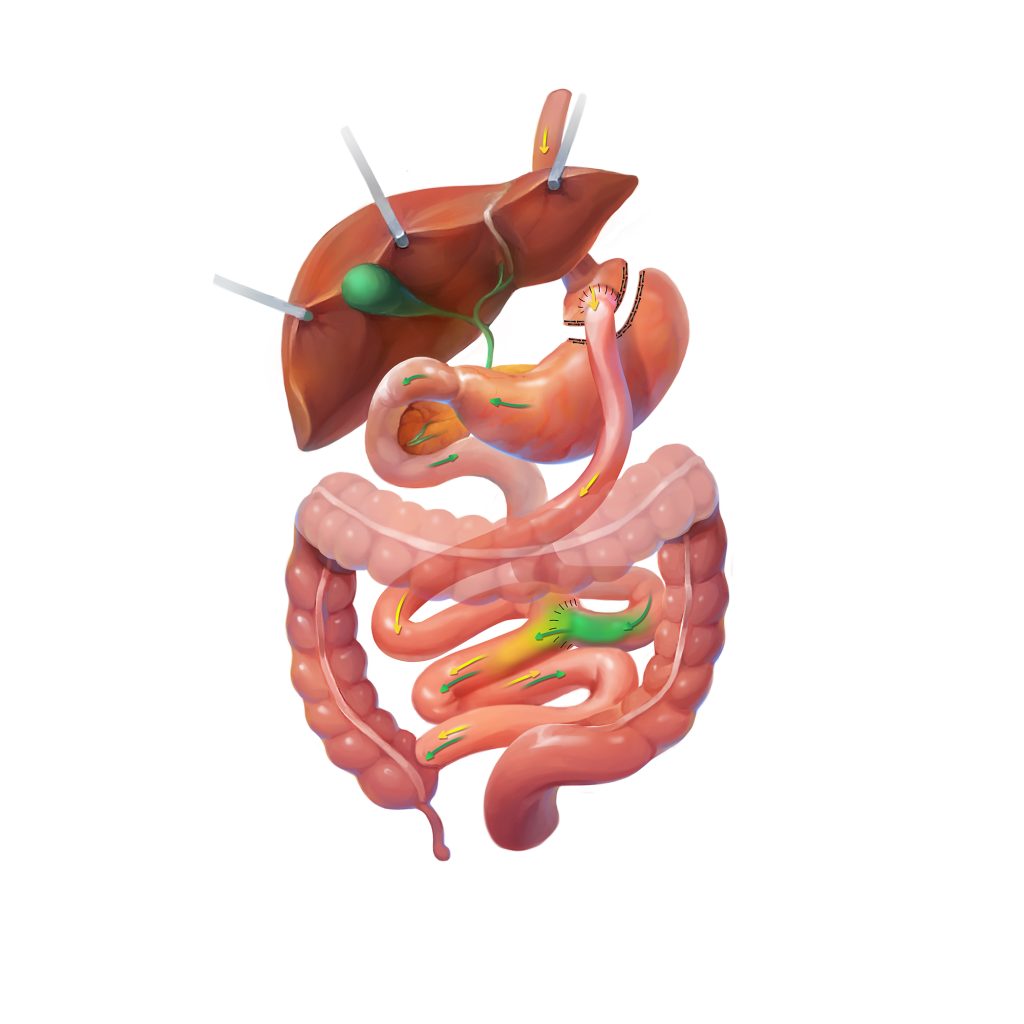 Gastric bypass has been performed in the US for over 50 years. The bypass has always been considered the gold standard in bariatric surgery because of its exceptional weight loss potential and the multitude of obesity-related diseases that it improves or eliminates entirely. As a combination of restrictive and malabsorptive procedures, the gastric bypass not only offers the greatest weight loss potential of the procedures we offer but also excellent improvements in type II diabetes and acid reflux.
Gastric bypass has been performed in the US for over 50 years. The bypass has always been considered the gold standard in bariatric surgery because of its exceptional weight loss potential and the multitude of obesity-related diseases that it improves or eliminates entirely. As a combination of restrictive and malabsorptive procedures, the gastric bypass not only offers the greatest weight loss potential of the procedures we offer but also excellent improvements in type II diabetes and acid reflux.
Who Qualifies for Gastric Bypass Surgery?
To qualify for this procedure, patients must have a BMI of 35 or over with at least one obesity-related condition (such as hypertension, diabetes, sleep apnea, hyperlipidemia, etc.) or a BMI of 40 or over regardless of obesity-related conditions.
How the Gastric Bypass Is Performed
As with most of our procedures, gastric bypass is performed minimally invasively using either traditional laparoscopy or robotically assisted technology. Four small incisions are made in the abdomen, and a slightly larger but hidden incision is made in the umbilicus.
In the first part of the gastric bypass, the surgeon creates a smaller stomach pouch by cutting away approximately 80-85% of the existing stomach. The remaining usable stomach is about the size of a golf ball and holds far less food. This is the restrictive portion of the procedure, which causes patients to feel fuller and eat less food.
The surgeon then attaches a Y-shaped section of the small intestine directly to this pouch. This allows food to bypass a portion of the small intestine. The small intestine absorbs calories and nutrients, and bypassing it eliminates some of that absorption and, in turn, calories.
The gastric bypass takes approximately 90 minutes to perform during which time the patient is under general anesthesia.
Life After Gastric Bypass
The goal of gastric bypass is to improve overall quality of life and do so very effectively. Gastric bypass patients typically lose over 70 percent of their excess weight, and in most patients with type II Diabetes, high blood pressure and cholesterol will be improved or resolved.
Indeed, the gastric bypass is particularly effective for those who have had trouble controlling their type II diabetes or acid reflux.
Recovery time is moderate, with most patients being able to leave the hospital within two days and return to work and light activity in less than three weeks. Full recovery requires about six weeks.
Potential Risks and Concerns of Gastric Bypass
- “Dumping syndrome” can occur from eating high-fat, high-sugar foods after the gastric bypass procedure, to a surgeon this is not an entirely undesirable problem. It simply means the patient is consuming foods they shouldn’t be eating in the first place
- Patients must supplement their diet with a daily multivitamin and calcium, and some patients will have to take vitamin B12 and/or iron
- The stomach, duodenum, and parts of the small intestine cannot be easily evaluated using X-ray or endoscopy if there are complications after surgery, such as ulcers, bleeding, or malignancy. However, there are advanced techniques which allow us to detect these conditions
- The most severe, but fortunately uncommon, risk is that of a leak along the staple line made during surgery. Our surgeons have a great deal of experience with this complication and take steps both during and after surgery to help ensure a leak does not occur
- Ulcers
- Increased flatulence
- As with any surgical procedure, there are inherent risks including infection, blood loss, and pain. Please speak to your surgeon about these and other risks
A Note On Dumping Syndrome
Dumping syndrome, also known as rapid gastric emptying, is a common side effect of gastric bypass surgery. In its most basic form, dumping syndrome occurs when food passes through the stomach and dumps into the small intestine largely undigested. This causes the body to create a spike in insulin which results in symptoms similar to hypoglycemia or low blood sugar.
Most of these symptoms are very uncomfortable and they can include nausea, abdominal cramping, vomiting, fatigue, muscle aches, and soreness to name a few. Symptoms may be felt immediately after consuming a meal or up to three hours afterward.
While it is not a life-threatening condition, dumping syndrome can be very uncomfortable. About half of gastric bypass patients will feel the effects of dumping syndrome to some degree at some point after their surgery. This condition is usually caused by eating high-fat or high-sugar foods in excess, or by drinking too much liquid during a meal.
In order to avoid this, we suggest that consuming liquids be limited to forty-five minutes before or after the meal – not drinking liquids during the meal. Also, avoiding high-fat and high-sugar foods will decrease the possibility of dumping syndrome.
